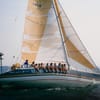When Tracy Edwards was expelled from school at age 15, little did she know that she would make nautical history. As the skipper of Maiden, she led the first all-female sailing crew competing in the 1989/90 Whitbread Round the World Race. It's one of the most challenging sailing competitions on Earth. covering 32.000 nautical miles across the oceans. The crew had to navigate house-high waves, storms, and collisions with whales and icebergs.
Tracy Edwards discovered her love for navigation while working on charter yachts as a teenager. “My teenage years had not been very happy and sailing quite literally saved me when I backpacked to Greece at the age of 16,” she remembers. After her second transatlantic sailing trip, the skipper asked her a question that should forever change the course of her life: “Can you navigate?” And Tracy answered: “Of course, I can’t. I was expelled from school before long division.” The skipper taught her not to be a bystander in her own life, but to start participating. Within two days, Tracy learned to navigate and later managed to secure a place on the yacht Atlantic Privateer as the crew’s cook, her only chance to participate in the 1985/86 Whitbread Round the World Race.
Tracy Edwards and Maiden: How the story started
After the race, she wanted to go again, but this time as a navigator. “I realized that no man would ever let me do this,” she tells The Overview. This was the beginning of Tracy Edwards and “Maiden Great Britain.” Fellow yachters and the press met her ambition either with antipathy or disbelief, but she kept focusing on her goal.
She was so determined, that in 1987, Tracy mortgaged her house to buy a “wreck with a pedigree” called “Prestige”. Six months later, she and her crew had transformed it into the yacht “Maiden.” It took them almost four years to get to the start line of the Whitbread. Why? Because no sponsor was willing to fund the first all-female sailing crew, except for one person: King Hussein of Jordan.
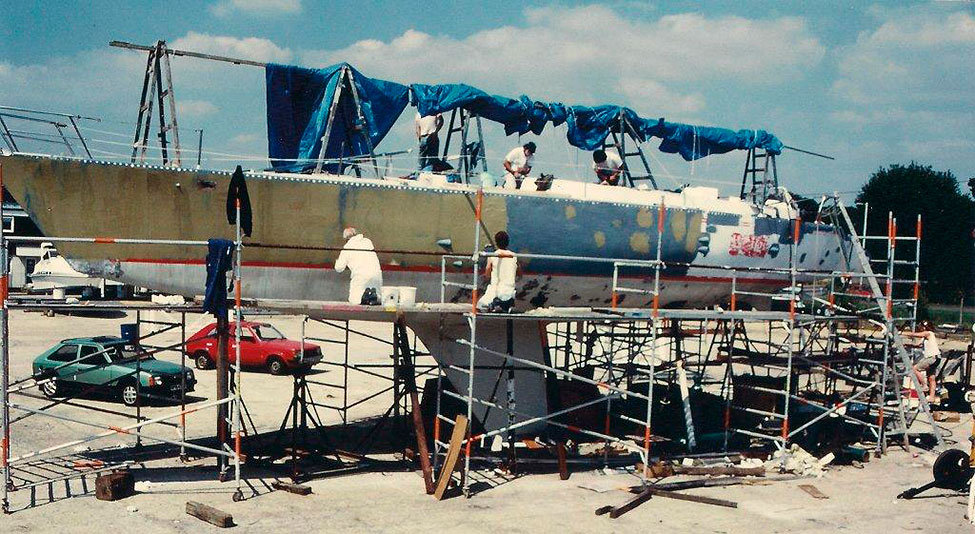
Building Maiden took Tracy Edwards and her team over six months. Photo via www.themaidenfactor.org
He offered the support of Royal Jordanian Airlines. Tracy describes their friendship on the Maiden Factor’s website. With his support, she and her team challenged chauvinism and proved how sailing is a level playing field. They won two of the toughest legs and made 2nd place overall in their class, the best result for a British boat in many years, and they are unbeaten to this day.
In this interview, Tracy reflects on her sailing career and shares her most important lessons learned.
You describe sailing as “total freedom", and the most incredible moment for you is when the land disappears. What makes this moment so unique?
Tracy Edwards: I think there is this notion that when you stand at the beach looking out at sea, it seems like the end of the world. You can’t go any further. When you set sail, suddenly, the ocean is the beginning of everything, and the land is the end. I still remember the first time I was on a boat and couldn’t see any land; this exhilaration and sense of freedom and possibility. I’m not someone that likes to go out sailing for a day. I need to go somewhere far away. I usually get seasick, and for two days, I’m throwing up over the side before my body adjusts. But the feeling of leaving land behind makes up for it.
Filmmaker Alex Holmes condensed the inspiring story of Maiden in the namesake documentary.
How would you describe everyday life on the high seas?
Tracy Edwards: Life on a boat is a microcosm, and you share this little space of 18 meters in length with 12 women. The senses are accentuated, heightened, and exaggerated — your perception changes. There is nowhere to hide. You can’t just leave as you would in the office and slam the door. As a skipper, you’re on display all the time. Everyone pays attention to your reactions, emotions, and what you’re saying. Sometimes when I was worried, I would hide that. But most of the time, you just are what you are.
Being yourself also contributes to an honest team. We had already done all those miles before the race, and we spent longer together than almost any other team because we had to build Maiden ourselves and fight so hard to get to the start line. And then, when we finally crossed it, we were battle-hardened. We had a bit of a wobble before the start, which was my fault, no one else’s. But because of the team's strength, we pulled back from that. When we finally set off, we knew that we could do well.
You refer to the conflict between you and your first mate, Marie-Claude Kieffer Heys, which led to her dismissal shortly before the race. Looking back at your younger self today, how would you have handled the situation differently?
Tracy Edwards: I regret very few things in my life, and one is not dealing with this situation more maturely. Because six months before that happened, I should have had a conversation with her. But I didn’t have the confidence. And I thought: “She’s better than me. I don’t want to lose her. I can’t run this without her.” Some pretty selfish thinking was going on there on my part. Because it wasn’t about her; it was about my success and what I wanted.
As a leader, you have to consider everyone’s position. I did not tell her until two weeks before the start of the race. I scuppered at any chance she had of getting on another boat, and that was awful. After the race, we talked for a long time, and today, we are best friends. She’s looking after Maiden in Hamble as we speak. But I think what I’ve realized from that situation is not letting it escalate in the first place and having difficult conversations much earlier with people. I’ve also learned how to speak with team members without flattening them, have a positive engagement, and be more candid.
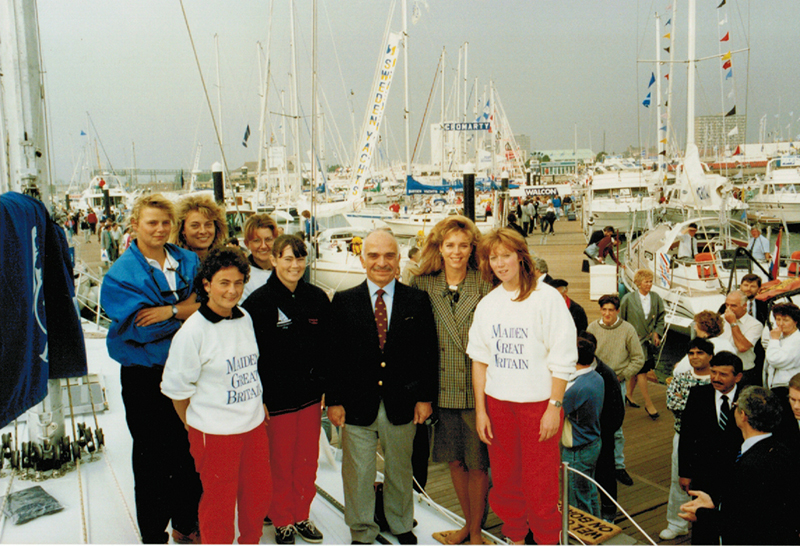
“If I had not met HM King Hussein I of Jordan and if he had not stepped in, Maiden would not have happened,” recalls Tracy Edwards. Photo via www.themaidenfactor.org.
Before participating in the Whitbread Round The World Race with an all-female crew, you did the race working as a cook on the yacht Atlantic Privateer with a men’s team. How would you compare the two experiences?
Tracy Edwards: I am in quite a unique position because I’ve raced around the world with 17 men and 12 women, so the comparison is interesting. I don’t want to say that one is better than the other. It’s just very different. With mixed and male crews, I’ve seen a lot of friction. I like sailing with men, but there is this lack of pressure and ego with women, the lack of having to be something you’re not.
The guys on Atlantic Privateer would drive me nuts because they wouldn’t talk. They could go days without saying a word. We always talked on the women’s boat, and we didn’t have a single argument the whole trip. We had feisty discussions about which sails should be up because I didn’t have a team of sheep. I had a group of smart, strong, and skilled women who all had opinions. So we had some very in-depth debates about how we were sailing the boat, but we never had an argument that involved personalities.
In a TED Talk, you mentioned that every ocean has its personality. In which way?
Tracy Edwards: The North Atlantic Ocean is probably my favorite ocean. It’s like a gangly puppy, carefree, just getting on with it. Even when there’s a storm, or it’s gray, nasty, and horrible, it still has that sense of excitement, and you feel you’ll be okay. And then there is the Southern Ocean, which is brooding. You don’t get a second chance; there is this sense of darkness and foreboding.
You feel like you’re being watched in the Southern Ocean. I know that sounds weird, but we all experienced this. Maybe it’s because of the albatrosses that are always looking at you. And the South Atlantic is sort of between the two. It’s the joyful happiness of the North Atlantic and not quite as brooding as the Southern Ocean. It’s like a stepping stone, a teacher showing you what the waves will be like in the Southern Ocean.
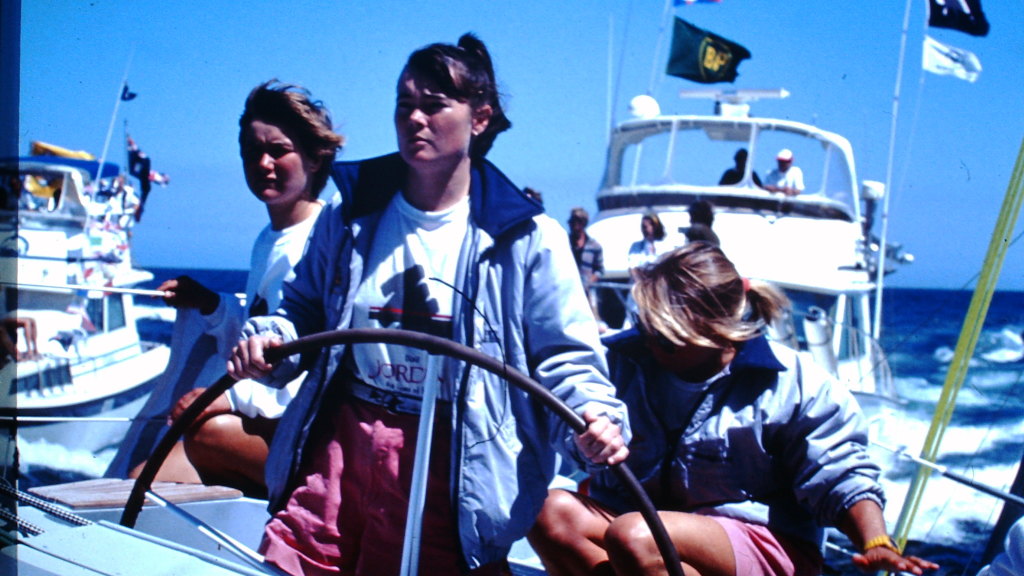
Tracy Edwards sailing Maiden during the Whitbread Round the World Race. Photo: Courtesy of Sony Pictures Classics
How did you manage to deal with the temper of the Southern Ocean and extreme situations?
Tracy Edwards: Especially if you’re sailing long distances, you quickly slip into a routine. As soon as you lose sight of land, that world is gone; you’re here and now, and you’ll go straight into your watch system. So everyone has a task, and the watches are changing. You’ve got a structure that works, which you have planned and practiced for in advance. So, with that functioning routine, you can reduce the risks. You’ve prepared to account for every possible eventuality, but there will be something that you haven’t planned for. But as long as you’ve put the right processes in place, you’ll be able to deal with those unexpected events if they happen. And you are always looking ahead to the potential of what could happen. You know what weather is coming up and keep the crew informed.
How did the harsh weather conditions in the Southern Ocean affect your body?
Tracy Edwards: In the Southern Ocean, minus 30 degrees below freezing, your body starts deteriorating. It works differently. So you lose a lot of weight very quickly. And you get frostbite on your hands. The wounds don’t heal that fast, and your hair stops growing. You’re primarily on dried food, so you don’t have the balanced nutrition you would normally have on land. What your body is going through is pretty drastic. And I think that’s why it’s so crucial to be with a crew you respect and trust because you don’t want those physical changes to start affecting your mental health.
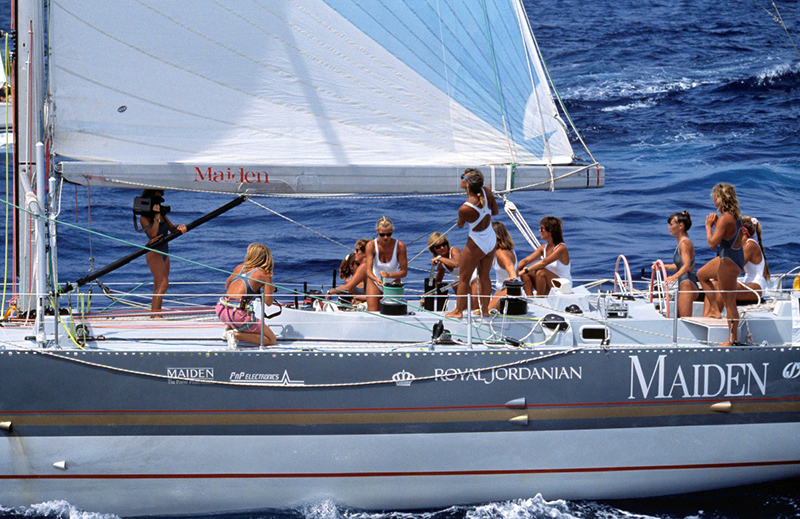
Tracy Edwards and her team while Maiden finished a leg in Fort Lauderdale during the 1989/90 Whitbread Round the World Race. Photo via themaidenfactor.org
That’s the cue for my next question, which is about a Tweet you posted last year on World Mental Health Day stating: “I am often asked what happened after Maiden, and for years I lied. But now, I hope the truth helps others. I had a complete breakdown. Only then did I learn that pretending to be strong is no substitute for asking for help.” Please tell us about the time after the race.
Tracy Edwards: First, it was this massive high, and then I had to sell Maiden, which brought me down to earth with a bump. All the girls were going off to their following jobs. And suddenly, you start looking around, and the whole fleet is gone. I then published a book about Maiden and did many talks and events, up to three daily. I was never at home, driving everywhere alone, surrounded by new people daily. The change of lifestyle was shocking. But it never occurred to me that this might be too much. I had a breakdown. At that time, nobody talked about mental health; quite the opposite, there was no room for vulnerability.
How did you cope with the breakdown after Maiden?
Tracy Edwards: I finally asked for help but did it quietly. I disappeared off the face of the earth for two years, went to Wales, and rebuilt myself. Now, talking about mental health is getting more accepted. Sports stars open up about going to therapy after ending their careers, so I thought I should be honest about it, too. People used to tell me, “Of course, your next project will succeed because you never give up.” But that’s not always the case, and I’m not always that strong. I have doubts like everyone else. Life is messy, and that’s okay. It’s just that I’m probably more bloody-minded than most people. But talking about it has been one of the most positive things I’ve ever done. I especially enjoyed mentoring and speaking at schools, universities, and colleges last year, sharing my experiences with young people.
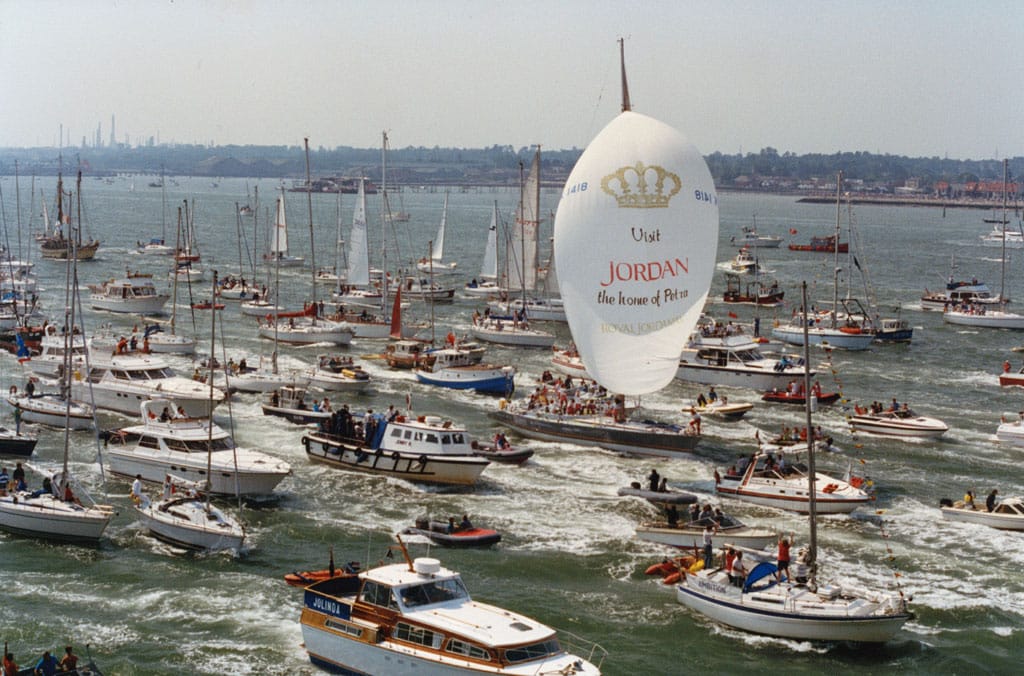
Tracy Edwards and her team onboard Maiden were welcomed by fans in Southampton in 1990 after completing 32,000 nautical miles. Photo via themaidenfactor.org
What were you addressing in these talks?
Tracy Edwards: Over the last year, as we’ve all been affected by the pandemic, I’ve given many talks about resilience. And I did a lot of thinking about Maiden and the time after, between then and now. A young woman in the audience said: “Of course you have resilience. You have 40 years of sailing experience.” And then I answered that I’d probably built resilience already before sailing. I just didn’t consciously think about it.
You’re not necessarily born with resilience. Strength of character comes with the life experiences that mold you, and it’s what you take away from them. So, if you’re aware of your experiences and contemplate and dissect them, you can store these lessons away for future reference. Through that thought process, you can build resilience; after the pandemic, we will do that even more.
In 2014, you found Maiden abandoned and in bad condition in Seychelles and decided to restore her with the financial help of King Hussein’s daughter, Princess Haya. In 2018, Maiden set sail on a three-year trip advocating for girls’ education, visiting over 30 destinations in over 22 countries. How has your experience with the education system motivated you to start this project?
Tracy Edwards: At 15, I threw away an education gifted to me on a silver plate. I felt hugely guilty about giving up something that some girls would die fighting for. When I stopped sailing, I had no qualifications and only limited options. I went into sailing management but didn’t enjoy it that much. Today, I’m passionate about education. After we restored Maiden, we wondered, “What will we do with her?” We thought raising awareness and money for girls’ education would be a great idea, so we initiated the Maiden Factor Foundation.
The tour stalled last year due to the pandemic. Do you have an idea when Maiden can continue its journey?
Tracy Edwards: Hopefully, in September. Then, we will focus very much on STEM subjects because we’re pushing against an open door. So many girls visiting us onboard Maiden and listening to our story are inspired and wonder how they can pursue a career in a science-related field such as navigation, math, engineering, or marine biology. I’ve only been at sea for 40 years but have noticed many environmental changes.
What changes exactly have you noticed?
Tracy Edwards: The first Atlantic crossing I ever did was in 1980, and the trade winds, which sailors relied on for hundreds of years, were very exact. You would go to a certain point in the ocean, and the trade winds would kick in. There was a reliable pattern. It was the same when I sailed in the Indian Ocean a year afterward. And today, 40 years later, the reliability of the trade winds barely exists anymore. I also don’t remember seeing pollution in the water, oil slicks, or floating plastic back then. On our recent trips with Maiden, we’ve encountered so much rubbish. The crew picks plastic out of the ocean whenever possible, but some pieces are too big, like these driftnets that kill so much wildlife.
This interview has been edited and condensed for clarity.


